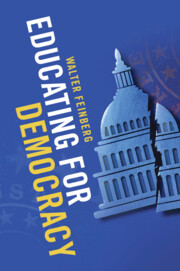Book contents
- Educating for Democracy
- Educating for Democracy
- Copyright page
- Dedication
- Contents
- Acknowledgments
- Introduction
- 1 Citizen, the Most Important Office in a Democracy
- 2 Educating for the Office of Citizen
- 3 Reflection as an Educational Aim of the New Patriot
- 4 The Humanities
- 5 The Humanities
- 6 STEM and the Democratic Aims of Mathematics Education
- 7 STEM and the Democratic Aims of Science Education
- 8 The Expressive Curriculum
- 9 Democratic Education and Moral Growth
- Index
8 - The Expressive Curriculum
Published online by Cambridge University Press: 20 April 2023
- Educating for Democracy
- Educating for Democracy
- Copyright page
- Dedication
- Contents
- Acknowledgments
- Introduction
- 1 Citizen, the Most Important Office in a Democracy
- 2 Educating for the Office of Citizen
- 3 Reflection as an Educational Aim of the New Patriot
- 4 The Humanities
- 5 The Humanities
- 6 STEM and the Democratic Aims of Mathematics Education
- 7 STEM and the Democratic Aims of Science Education
- 8 The Expressive Curriculum
- 9 Democratic Education and Moral Growth
- Index
Summary
Abstract: The capacity of artistic works to speak directly to the emotions – to move us in one way or another – is a critical consideration in determining how an experience is to be represented and who should do the representation. When significant groups are left out of the national story, or when some groups dominate the storytelling, distortion is a likely result. But the distortion is not only of the past experience; it continues to influence the present and the future. It perpetuates harm. A powerful response to this harm comes from those who have been left out or whose experience has been distorted. Protest art serves to penetrate and challenge these distortions.
Keywords
- Type
- Chapter
- Information
- Educating for Democracy , pp. 119 - 139Publisher: Cambridge University PressPrint publication year: 2023

